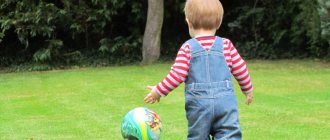The reasons why speech development in a child is delayed can be different.
Various factors have an influence - from physiology to psychological aspects. Some of them can be corrected independently, with others you will have to seek help from a specialist, but it is extremely important to understand what “prevents” the child from speaking. Qualified assistance will be provided by a professional speech therapist-defectologist. During the initial examination, the specialist will determine the reasons why speech is delayed and suggest methods of correction.
Reason 1. Individual pace
Of course, every child is unique and must develop on their own schedule. If your baby went a month earlier than your neighbor’s son, but said the word “mom” a few weeks later, there is nothing wrong with that. Everyone has their own pace.
This delay in speech development is called tempo. With a slight delay, everything will return to normal and the child will develop his ability to speak in the same way as all children.
Just pay attention that experts “allow” only a slight lag from the norm to be attributed to individuality. Be careful!
Why may a child not speak at 2 years old?
Normally, upon reaching the age of two, the baby should actively communicate with parents and loved ones, call a spade a spade, and tell various stories. But it happens that a child at 2 years old does not yet utter any words or does it very poorly. The reasons for this may be:
- No need for speech . This can happen in two opposite situations. Firstly, when parents hardly talk to the child, he spends a lot of time in front of the TV or computer - there is simply no one to communicate with. Secondly, when parents try to say everything for the child, predict his desires by gestures and sounds, formulate simple questions that can be answered “yes/no” - then the baby simply has no need to engage in communication.
- Hereditary diseases that are accompanied by speech development delay (SSD)
- The nature of the speech of parents and the environment . If the speech of the adults around the child is fluent, fast, and unclear, then the children are not able to repeat all this.
- Difficult labor (rapid, with entanglement of the umbilical cord) or trauma to the child during birth (trauma to the cervical spine and/or central nervous system) can also lead to delayed speech development in the child
- Severe infections and traumas (psycho-emotional traumas as well) suffered by the child at an early age, which negatively affected the overall development of speech in the child. It is also important to understand that delayed speech development can be an accompanying symptom of more serious diseases, such as cerebral palsy, epilepsy or congenital abnormalities of the central nervous system.
Reason 4. Bilingual family
Bilingual children “have the right” to begin to speak with some lag behind the norm. Hearing different languages spoken around them, they find themselves in a more difficult situation than their peers who only need to master one language.
In order to correctly construct speech, a child needs to separate one language from another. This requires some time. So it is quite possible that there is a delay in the onset of speech formation, the absence of common sentences, and errors in the grammatical construction of phrases.
What should a child say at two years old?
Imperfections in the pronunciation side of a child’s speech at this age are a natural phenomenon. He still pronounces most sounds incorrectly, misses sounds when pronouncing words and individual syllables when pronouncing polysyllabic words, and softens consonants. The voice of some children is still quiet and weak, they pronounce even simple words indistinctly, and this is also a variant of the norm. Two-year-olds have a small vocabulary, they use words denoting well-known objects and toys, and can still use lightweight words like “bye-bye” instead of “sleep”, “yum-yum” instead of “eat”.
However, a child is already able to speak at 2 years old in short phrases of 2-4 words, and can ask a question, for example, “What is this?” A two-year-old child with speech development within normal limits, on his own initiative, addresses peers and familiar adults, using the active vocabulary that is available to him. And not so little is available to him - at the border between the second and third years, the vocabulary is at least 50-100 words, and by 2.5 years this number triples.
If you work with the baby purposefully, telling him the signs of objects and actions that children and adults perform, then the active dictionary contains not only nouns, but also adjectives, verbs, and adverbs.
Despite a fairly capacious vocabulary, the words in a sentence are often inconsistent and phrases are constructed incorrectly. The inability to form correct grammatical forms is the norm at this age. For example, if a child at 2 years old says this: at home - at home, after washing, a beautiful jacket - a beautiful jacket, a rug - a rug, then this is normal.
The baby not only asks questions himself, he is able to answer simple questions from an adult, that is, he distinguishes interrogative intonation. In addition, he can follow simple verbal instructions consisting of 2-3 steps: “first take the spoon, and then take it to the table.” Since the organs of articulation are not strong enough to clearly pronounce sounds, 2-year-old children still pronounce the sounds incorrectly: s, s, z, z, ts, sh, zh, h, sch, l, r.
Reason 5. Stress, unfavorable psychological environment
Unfortunately, stress affects not only adults, but also children. Severe fear, an uncomfortable psychological climate in the family, even quarrels between parents can cause a delay in speech formation. Children need calm, positive emotions and a reasonable daily routine.
Strong experiences, fear, and psychological trauma can lead to stuttering and delayed speech and mental development.
Separately, it is worth highlighting the problem of “hospitalism” in children. Absent speech syndrome caused by separation from family in institutionalized children is associated with both psychological stress and communication deficits. Unfortunately, cases of this syndrome also occur in domestic children. Formal child care without established communication, love and attention from loved ones provokes developmental delays.
Treatment of children with delayed speech development, how to treat children with speech disorders
Fortunately, Sarklinik has treated hundreds of children with delays in speech, psycho-speech, mental, motor, and psychomotor development. Treatment of alalia, treatment of dyslalia, treatment of general speech underdevelopment, treatment of dysgraphia, treatment of acalculia, treatment of encopresis, treatment of perinatal encephalopathy, treatment of tone disorders, treatment of akataphasia, treatment of akatagraphy, treatment of intracranial hypertension syndrome, treatment of dyslexia, treatment of autism, treatment of cerebral palsy, treatment are provided. enuresis, treatment of minimal cerebral dysfunction in Russia, in the Saratov region, in Saratov. Sarklinik knows how to teach a child to speak, how to treat and cure a child, how to treat delayed speech development in a child , how to treat delayed psycho-speech development in children, how to cure delayed neuropsychological development, how to give impetus to speech development, how to replenish vocabulary, how improve speech. Treatment methods have proven themselves over the years. Severe, moderate, and mild delays in psycho-speech development, and mental retardation are treated. Sarclinic works with serious diagnoses, when parents have less and less hope for recovery. Unfortunately, in such cases, as a rule, multiple courses of complex treatment are required, as a result of which memory, thinking, speech, mental development, motor sphere, and motor activity are improved. There is extensive experience in treating children with pediatric pathologies aged from 3 months to 17 years. There are plans to publish a video course “ How to teach a child to speak ?” On the medical website sarclinic.ru you can ask a doctor a question online for free and read patient reviews. Help your child right now!
There are contraindications.
Specialist consultation is required. Sign up for a consultation .
Text: ® SARCLINIC | Sarclinic.com \ Sarlinic.ru Photo: (©) Hyrman | Dreamstime.com \ Dreamstock.ru The child depicted in the photo is a model, does not suffer from the diseases described and/or all similarities are excluded.
Related posts:
Help enuresis, where to get treatment for enuresis in Russia, Saratov
Perinatal damage to the central nervous system, central nervous system in newborns, organic damage to the central nervous system
Why is my child doing poorly at school? I am doing very poorly, what should I do?
The child stutters, began to stutter, began to stutter, what to do
Enuresis in adolescents, teenage enuresis, treatment of enuresis
Comments ()
Reason 11. Alalia
This term means primary underdevelopment of speech centers. Occurs as a result of damage to the cerebral cortex during early infancy or fetal development. This condition is described in more detail in the article about alalia.
Let’s just say that you won’t be able to cope with alalia on your own; be sure to seek help from specialists.
Also check if your child has echolalia.
Norms of speech development
Let's look at the basic norms of speech development in children. Many parents believe that before their child speaks his first words (often around the age of about a year), it is useless to talk to him, since he still does not understand anything and cannot yet learn anything. But this is an extremely erroneous opinion, because speech development begins from the first days of a baby’s life.
The first stage of this process is screaming . While the baby was in the mother's belly, all his needs were satisfied instantly. But, finding himself in a completely different environment, he needs to find a way to somehow express himself and give a signal that his needs are not satisfied (wet, want to eat or sleep, sad, etc.). That is, a cry becomes a signal of discomfort at the level of an unconditioned reflex.
The second stage is humming . It usually occurs at the age of one to two months and accompanies the child in the first six months of life. These are different variations of sounds: a-a-gu, gee-s, ge-e, a-gy, etc. With the appearance of a significant adult, the child’s chatter becomes much more active, he looks into your eyes, waits for your answer and is already trying to build a full-fledged verbal dialogue. It is very important to maintain this “dialogue” and talk with the child as much as possible.
Babbling is the third stage of speech development. A child begins to babble at approximately 6-7 months of age. The baby begins to pronounce individual syllables “ba”, “ma”, “ta”, etc. - at first once, very rarely and as if by accident. Gradually, syllables are heard in his speech more and more often, they are repeated in the form of chains: ba-ba-ba-ba, ma-ma-ma-ma.
The stage of first words begins at 11-12 months of a child’s life. He begins to associate words with objects in the environment, words are filled with meaning for him. By this time, the child has already formed an active (from 3 to 10 spoken words) and passive (up to 20 understood words) vocabulary. By the age of 1.5 years, the vocabulary increases to 40-70 words, and at 2 years the baby already uses from 150 to 300 words. The child begins to speak in sentences. At first they consist of two words (mama give, lalya boo, etc.), and then of three or four.
It is always worth understanding that each child develops individually, and if there are short-term delays in passing the stages of speech development, this is not yet a sign of deviations. But, if the delays are quite long or some stages of development are completely absent, this is a significant reason to contact a specialist.
Precautionary measures
Listening to music has a great effect on the development of the speech apparatus
If you do not develop your child’s speech, he will speak much later than his peers.
- Experts advise talking with the child, starting from the prenatal period. In the third trimester, the fetus perfectly recognizes sound vibrations.
- For a baby up to six months old, it is very important to monitor the parents’ articulatory apparatus. During this age period, children become aware of the connection between sound and the way their lips move. The child himself tries to repeat what comes to his ears, this is how humming initially appears, followed by babbling.
- It is important to surround your child with communication. You need to talk like you would with an adult, correctly, clearly, without rushing. Ask the baby questions, let him also enter into dialogue. You should not think that the little one is too small and does not understand what is being said to him.
- No need to babble and lisp. If, when you see a child, you begin to use diminutive suffixes, for example, kashechka, little car, then the toddler will develop an incorrect speech function. You need to talk to a child like an adult.
- Music has a great effect on the development of the speech apparatus. Choose appropriate tunes, such as lullabies or classical music.
- Give your child as many tasks as possible to develop fine motor skills. You can resort to the use of special toys, let the child sort out the cereal, screw on the lids, attach clothespins, assemble a pyramid, sculpt from plasticine.
- Do not rush to give your child what he requires using gestures. Thus, you slow down the development of speech skills, because the baby understands that he can get what he needs without opening his mouth.
The ability to speak cannot exist without the skill of a good listener. Therefore, in an effort to develop the speech abilities of your little one, you need to talk to him a lot.
Now you know what to do if your baby doesn’t want to talk. Remember that both pathological reasons and developmental features that do not require any outside intervention can influence this. Therefore, it is extremely important to find out what exactly led to this phenomenon; perhaps the baby is simply too small to talk.
What is mutism and how does it affect a child’s speech?
Why a small child (for example, two years old) does not want to talk does not always indicate serious physical or mental disorders. It sometimes happens that during speech development, some verbal skills are delayed. Later they return to normal, and the child successfully catches up with his peers.
However, sometimes the absence of speech or its significant limitation may indicate mutism. What is mutism? This is a dysfunction of speech realization, which is accompanied by the ability to understand speech and use writing skills. That is, the child understands what they say, knows how to write, but does not know how to speak.
There is organic mutism, which is the result of anomalies in the anatomical structure of the vocal organs (larynx, palate, tongue, nerve centers of the brain). And functional mutism, the development of which is caused by psychological factors, for example, the child’s shyness, emotional hypersensitivity, long-term stress, anxiety, parental errors in upbringing, humiliation, refusal, physical and psychological abuse of the child.
Functional mutism is diagnosed when anatomical defects of the speech organs and neurological dysfunctions are excluded.
A child with functional mutism has the ability to speak and understand speech, but does not speak in important social situations. He refuses to speak, only nods and uses alternative nonverbal communication.
This type of mutism most often occurs in early childhood. It is also called hysterical, selective. Despite understanding speech, the child does not speak at all in certain situations, although in other circumstances he can speak quite freely.
Mutiotherapy primarily comes down to minimizing fear of conversation and developing confidence in the child. It is recommended to stimulate speech by rewarding the baby even for individual words, for example, with a prize or other reward.











